Politics
Is Zionism patriotism or racism? Big disagreements over a word in use for 125 years
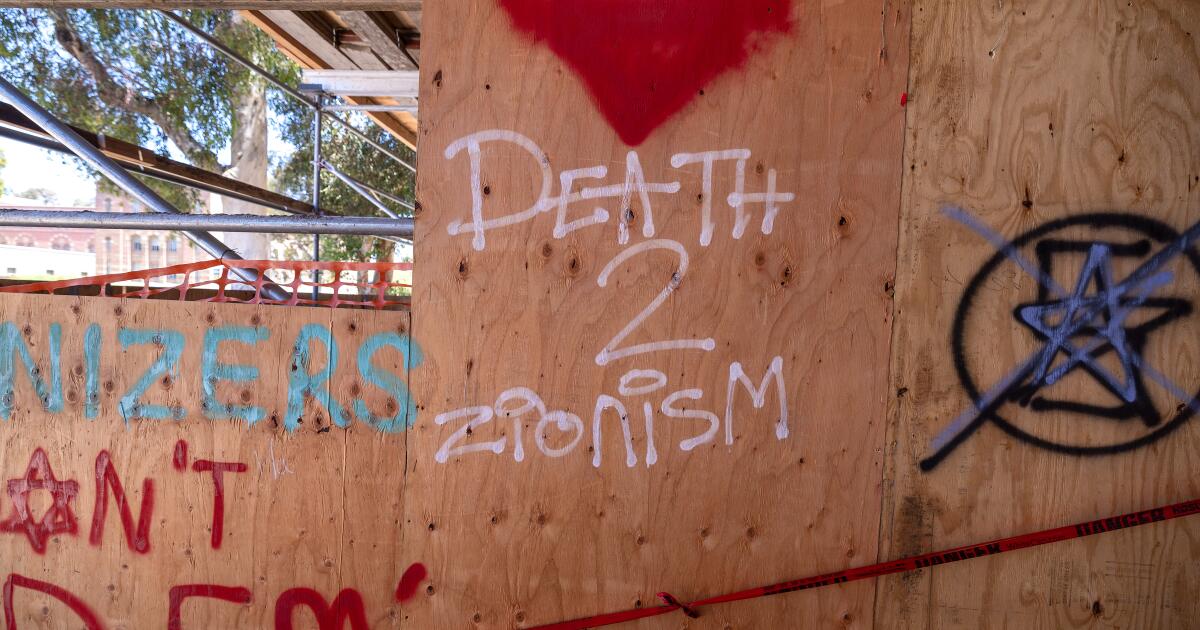
In the many debates over language surrounding the war in Gaza, few words are as controversial as “Zionism.”
Its original, most basic definition is Jewish nationalism.
For many, that equates to the right of the Jewish people to have their own state and self-determination in an ancestral homeland after centuries of oppression and ostracism in much of the world. They view anti-Zionism as a fig leaf for bigotry and antisemitism.
For others, Zionism is a form of modern-day colonialism or racist manifest destiny — the attempt to justify the seizure of contested land in the name of God.
Here’s a review of the history of the word and how competing definitions are inflaming the debate over the Israel-Hamas war in the Gaza Strip.
Where did the term come from?
The term “Zionism” first came into use in the late 1800s. It built upon “Zion,” a biblical term for Israel and Jerusalem, and the name of a site in Jerusalem where the temple most historically revered in Judaism was constructed millennia ago.
Its use was championed by a Jewish Austro-Hungarian journalist, Theodor Herzl, at the turn of the 19th century. He made it the label of a movement to send European Jews to an area eventually known as British Mandate Palestine so they could begin forming a Jewish homeland.
Outraged by what he considered the dangerous and prejudicial treatment of fellow Jews in Vienna in the late 19th century, Herzl, trained as a lawyer and a prolific writer, established the Zionist Organization, which explored the mission of creating a Jewish state. The organization eventually had branches in several European cities and attempted to lobby the mostly royal rulers of the day to make the dream of statehood come true.
“Perhaps our ambitious young men, to whom every road of advancement is now closed, and for whom the Jewish state throws open a bright prospect of freedom, happiness, and honor, perhaps they will see to it that this idea is spread,” Herzl wrote in a pamphlet called “Der Judenstaat” (the Jewish State), which outlined his vision and led to his Zionist movement. It was published in 1896.
Considered the father of political Zionism, Herzl did not live to see a Jewish state. He died of heart disease in 1904.
Did Zionism always envision statehood for Jews in what is now Israel?
In the hearts of most early-day Zionists like Herzl, the ideal was to create their Jewish state in the land between what is now Jordan and the Mediterranean Sea. Yet there were other ideas.
In 1903, British colonial rulers in Africa floated the so-called Uganda plan, which would have offered a section of the East Africa Protectorate as a homeland for Jews. (The land would eventually become part of modern-day Kenya.) Some of Herzl’s followers were willing to consider this, but a visit to survey the land found it to be inhospitable.
The Soviet Union proposed a Soviet Jewish Republic in Crimea, Ukraine; Italian fascists proposed a settlement in Italian East Africa. The Nazis at one point proposed shipping Jews to Madagascar. All of those plans were rooted more in ridding the continent of Jews than in giving them a homeland.
In 1947, after World War II, the United Nations General Assembly officially partitioned British Mandate Palestine into a Jewish state and an Arab one; the latter was never established. Arab powers in the region rejected the decision and not long after were at war with the new state of Israel.
How did the concept of anti-Zionism evolve in Soviet Russia?
In the years after Russia’s Bolshevik Revolution of 1917, many Russian Jews supported and participated in the country that became known as the Soviet Union. Initially, the Soviet Union was favorable to Zionism and the creation of an Israeli state.
But strains of anti-Jewish hatred that had long raged in Imperial Russia and led to waves of pogroms in the 18th and 19th centuries, as well as discriminatory residency and employment laws from Moscow to St. Petersburg, continued to permeate sectors of Soviet society.
As the years went on, and it became clear after World War II that the emerging Israel was going to hitch its wagon to the United States and the West, anti-Zionism became a more formal policy in the Soviet Union.
(The U.S. under President Truman was the first major power to recognize Israel, in 1948; Russia did the same, but Stalin reversed the decision within a year.)
Russia was home to tens of thousands of Jews, and for decades Soviet authorities refused to permit them to emigrate to Israel.
What was ‘Protocols of the Elders of Zion’?
One of the most notorious pieces of writing aimed at spreading hate and fear of Jews, “Protocols of the Elders of Zion,” was published in Russia in the early 1900s.
It was a fake document that purported to prove that Jews were a cabal sneakily trying to control the world through financial institutions, media and other centers of power. Though the text has been soundly and repeatedly discredited, copies still exist, and some of its portrayals of Jews remain frequent antisemitic tropes today.
What did Zionism come to mean for Jewish people — then and now?
Zionism to many Jewish people means, essentially, patriotism: a political ideology rooted in the establishment — and, later, promotion — of a refuge for Jews who throughout history had to escape pogroms, then a Holocaust aimed at wiping them out.
The Anti-Defamation League defines the concept this way: “Zionism is the movement for the self-determination and statehood for the Jewish people in their ancestral homeland, the land of Israel. The vast majority of Jews around the world feel a connection or kinship with Israel, whether or not they explicitly identify as Zionists, and regardless of their opinions on the policies of the Israeli government.”
There is not consensus, however, among Jews today over the precise definition of Zionism.
For many, it underpins Israel’s right to exist. For the more extreme, such as settlers occupying the West Bank and East Jerusalem land claimed by Palestinians, it is used to justify Jewish control of all the land, including the West Bank and Gaza Strip.
How do others view Zionism?
Over time, the definition and use of the word evolved and took on negative tones among critics of Israel. The U.N. formally declared Zionism a form of racism in a 1975 resolution, which it revoked 16 years later.
To Palestinians displaced by an emerging Israel, Zionism came to symbolize racism and exclusion from what they viewed as their homeland.
Is being anti-Zionist antisemitic?
On this question, there is abundant disagreement.
Many critics of Israel or Israeli government policy say opposing the expansion of the country’s control over land claimed by Palestinians is not an anti-Jewish or antisemitic position but one of fairness.
Yet many Jews would say denying their right to an unfettered homeland is indeed antisemitic. They say it is clear that the term “anti-Zionist” is being embraced by some anti-Israel demonstrators at U.S. college campuses as a politically correct cover for antisemitic intent.
How has the term been used at campus protests?
At hundreds of pro-Palestinian protests on university campuses in recent weeks, the terms “Zionism” or “Zionist” have been hurled disparagingly against Jewish students and pro-Israel demonstrators.
At UCLA this month, demonstrators stopped Jewish students at checkpoints and demanded menacingly: “Are you a Zionist?” Some said protesters of any faith were welcome but not “Zionists”; one told The Times the word refers to those who adhere to “a very violent, genocidal political ideology that is actively endangering people in Gaza.”
A group of Jewish students at Columbia University — where demonstrations were intense and led to police being called onto the Manhattan campus to break up pro-Palestinian encampments — wrote an open letter this month expressing dismay at the way the term was being bandied about.
“We proudly believe in the Jewish people’s right to self-determination in our historic homeland as a fundamental tenet of our Jewish identity,” the letter, signed by several hundred students, stated. “Contrary to what many have tried to sell you — no, Judaism cannot be separated from Israel. Zionism is, simply put, the manifestation of that belief.
“We are proud to be Jews, and we are proud to be Zionists,” the students wrote.
In many cases, it seems that the competing definitions have made use of such a misunderstood word problematic.
Ned Lazarus, an international affairs professor at George Washington University in the nation’s capital, said “Zionism” is now used as a litmus test by both sides with an array of sometimes contradictory criteria and components, erupting into a war of narratives and becoming weaponized.
“It should be a question to open a conversation,” Lazarus said, “not shut it down.”

Politics
Park Police union says officers ‘did everything they could’ during DC anti-Israel riot

Following the protests at Union Station by anti-Israel agitators defacing federal property in protest of Israeli Prime Minister Benjamin Netanyahu’s address to Congress, a Park Police union is pushing back against criticism that only a few arrests were made.
Thousands of Hamas-sympathizing agitators descended on Washington, D.C., Tuesday, at one point defacing federal monuments with phrases in support of the terrorist group responsible for the Oct. 7 attacks in Israel, saying, “Hamas is coming.”
Twenty-three people were arrested at the protests, but some have suggested that number should have been higher.
Sen. Marco Rubio, R-Fla., posted on X, “How many more times are they going to allow leftist degenerates who support terrorism and hate America to vandalize property and attack police? There should have been hundreds of arrests today in D.C. not just 23.”
HOUSE REPUBLICANS REPLACE AMERICAN FLAGS AT UNION STATION AFTER ANTI-ISRAEL PROTESTS
The Columbus Memorial Fountain at Union Station during an anti-Israel protest on the day Israeli Prime Minister Benjamin Netanyahu addressed a joint meeting of Congress on Capitol Hill in Washington July 24, 2024. (Reuters/Seth Herald)
But the U.S. Park Police Labor Committee is pushing back.
“Our officers on the ground did everything they could to protect life and property. In fact, despite having only 29 officers available to mitigate damage — 29! — with no additional help from the Department of the Interior, we processed several arrests for charges ranging from assault on a police officer to destruction of government property,” Kenneth Spencer, chairman of the United States Park Police Fraternal Order of Police, said in a statement.
“That’s why it’s so disheartening to hear some members of Congress and members of the media, many of whom describe themselves as ‘champions’ of law enforcement, suggesting that officers gave protesters a ‘pass’ or that insufficient arrests were made.
“Nothing could be further from the truth. Anyone who truly cares to understand the problem would see that our officer staffing crisis is at the root of our agency’s mission readiness. A small unit of 29 officers arrested 10 individuals while being assaulted by a mob of thousands. We simply did not have the staffing or resources to accomplish a mass arrest operation.”
SEE IT: THE MOST DRAMATIC PHOTOS FROM WEDNESDAY’S PRO-HAMAS WASHINGTON, D.C. PROTESTS
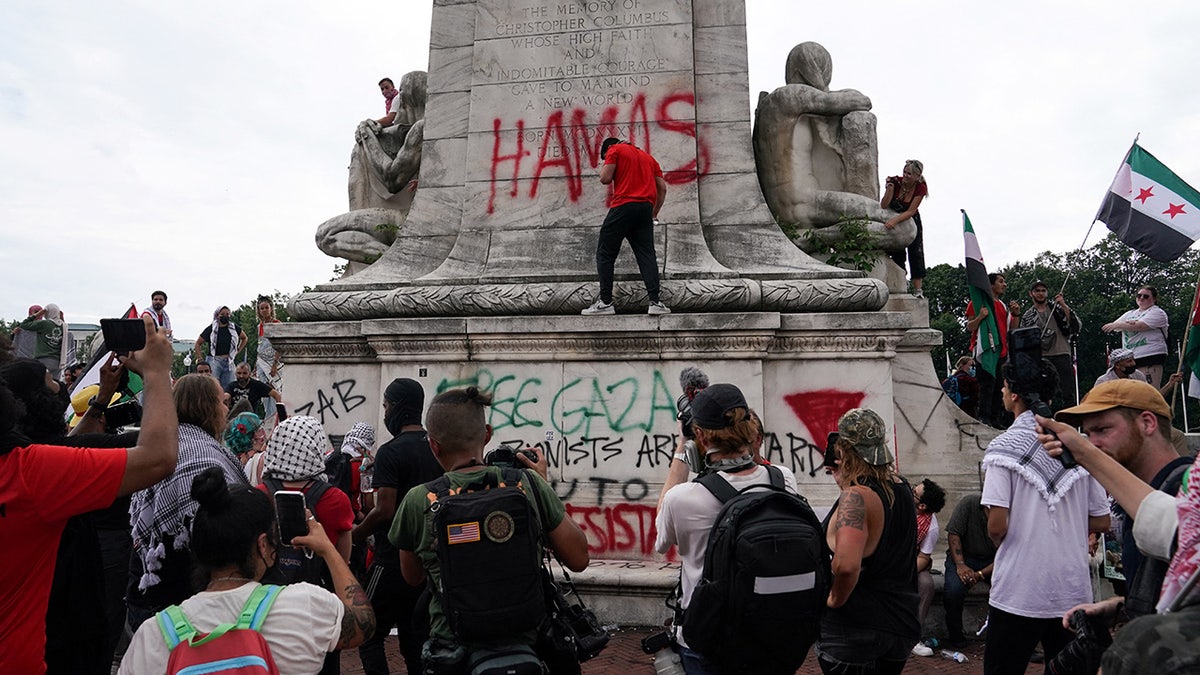
An anti-Israel demonstrator sprays graffiti on the Christopher Columbus Memorial Fountain at Union Station on the day of Israeli Prime Minister Benjamin Netanyahu’s address to a joint meeting of Congress on Capitol Hill in Washington July 24, 2024. (Reuters/Nathan Howard)
At least one demonstrator, whose face was covered, was spotted by Fox News carrying what appeared to be the flag of the terrorist group Hamas while others were heard shouting “Allahu Akbar.”
KAMALA HARRIS REACTS TO ANTI-ISRAEL RIOTS AT DC’S UNION STATION
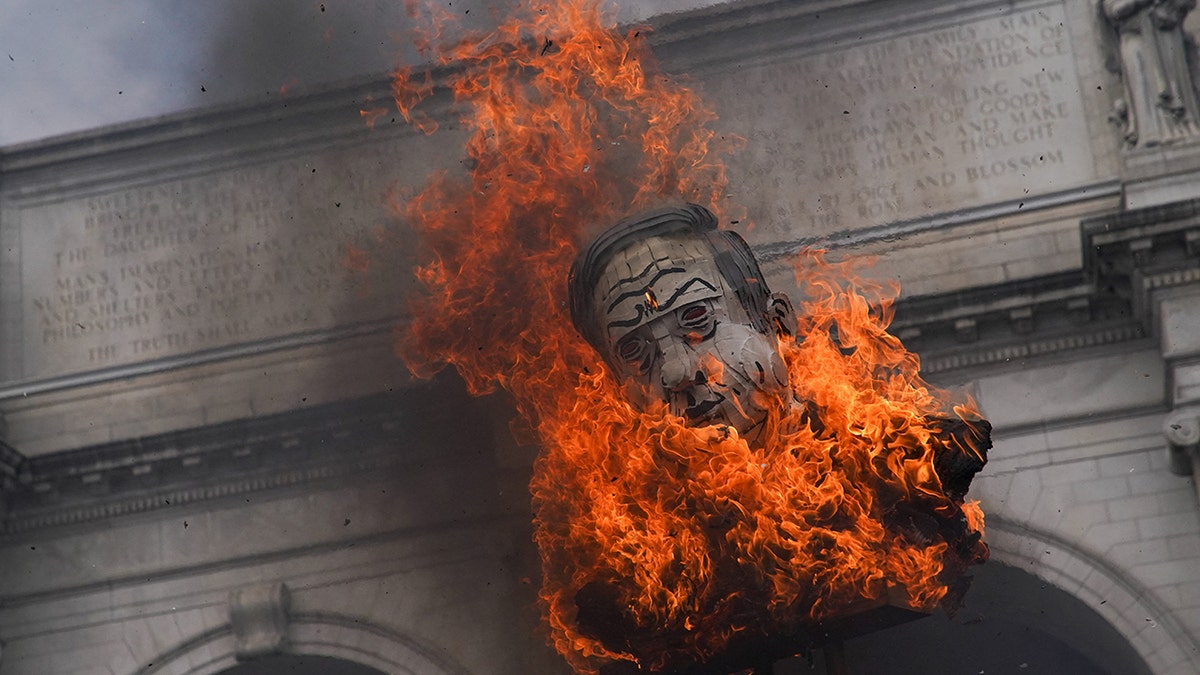
Anti-Israel demonstrators burn an effigy depicting Israeli Prime Minister Benjamin Netanyahu outside Union Station on the day of Netanyahu’s address to a joint meeting of Congress on Capitol Hill in Washington July 24, 2024. (Reuters/Nathan Howard)
The White House condemned the protests Wednesday evening, calling the chaos “disgraceful.”
“Identifying with evil terrorist organizations like Hamas, burning the American flag or forcibly removing the American flag and replacing it with another is disgraceful,” White House spokesperson Andrew Bates said in a comment to Fox News Digital Wednesday evening.
Politics
Ali: Kamala Harris has a campaign soundtrack: Beyoncé's 'Freedom'

Vice President Kamala Harris’ bid for the presidency has a soundtrack: Beyoncé’s “Freedom.”
The leading Democratic presidential candidate took the stage in her first visit to her Wilmington, Del. campaign headquarters and again during her first campaign rally in Wisconsin as the song played.
Now the cathartic anthem graces Harris’ first campaign ad, in which she says: “There are some people who think that we should be a country of chaos, of fear, of hate. But us? We choose something different: We choose freedom.”
Pit that against the musical number her competitor chose for his grand entrance on Night 3 of the Republican National Conference. Donald Trump walked out to James Brown’s “It’s a Man’s, Man’s, Man’s World,” a tone-deaf choice for a former president found liable for sexual abuse, who’s bragged about sexually assaulting women, a married man who paid hush money to a porn star and a former president who rolled back women’s reproductive rights 50 years with the repeal of Roe vs. Wade.
Maybe the Godfather of Soul would have endorsed Trump’s usage of his song, but Brown would be breaking with decades’ worth of musicians who’ve decried GOP candidates playing their tracks at rallies and booster events. Adele, Rihanna, R.E.M., the Rolling Stones, Prince, Neil Young, Guns N’ Roses and Queen are among the many artists who’ve spoken out against Trump using their tunes for campaign purposes.
Heart bristled when the McCain-Palin campaign used “Barracuda.” Tom Petty insisted George W. Bush back away from “I Won’t Back Down.” Bruce Springsteen decried Ronald Reagan’s appropriation of “Born in the U.S.A.”
Beyoncé, however, gave Harris her blessing to use “Freedom,” a single from her 2016 blockbuster album “Lemonade.” The song, which features guest rapper Kendrick Lamar, is an explosive expression of empowerment. At the time of its release, it spoke to public outcry around police killings of unarmed Black men and women — Eric Garner, Tamar Rice, Freddie Gray — and protests that were largely fueled by the ire of younger generations.
Whether Beyoncé was singing about the tyranny of a cheating spouse or racial injustice (or both), the song became an anthem for a new, potentially potent block of the American electorate.
For the first time, Gen Z and millennials could now account for as many votes as baby boomers and their elders, groups that have made up a majority of the electorate for decades.
Folks under 40 have grown up with Beyoncé and her ubiquitous work. Think of Beyoncé like the Who for boomers — their work is everywhere (Republican Sen. Rand Paul played the band’s anti-war hit “Baba O’Riley” when he campaigned in 2015) — or Nirvana for Gen X, except no one cares what we think. Whatever, nevermind.
The Harris campaign’s smart choice of music coincides with a willingness to lean into a meme culture that shot up organically around the 59-year-old VP since President Biden announced Sunday that he was dropping out of the race.
Pop star Charli XCX showed her support for Harris when she tweeted “Kamala IS brat.” The British singer is referring to the TikTok and Twitter edits of Harris’ image superimposed to songs from Charli XCX’s hit album “Brat.” The avalanche of memes come from a video clip in which Harris talks about her mother’s response to the hubris of youth: “You think you just fell out of a coconut tree? You exist in the context of all in which you live and what came before you.”
Right-wing social media used the quote to deride Harris as inarticulate and a “word salad” master, but liberal swaths of Gen Z have since reworked the clip into emojis and memes that celebrate Harris’ nonconformist approach. She’s become a viral sensation, in a good way, unlike J.D. Vance’s damning “single cat lady” memes and a cringey internet joke about encounters with couches.
It’s rare that relevant talent will shill for a Republican candidate. Case in point: Trump’s pop culture ambassadors at this year’s RNC were Kid Rock, Kanye’s ex Amber Rose and former WWE wrestler Hulk Hogan, whose big moment was ripping his shirt off and screaming “Let Trump mania run wild!”
Harris chose to let freedom ring, and she has Queen Bey behind her.
Politics
Texas sues Biden administration over program giving birth control to teens without parents' knowledge

Texas officials are challenging a recent order from President Biden’s administration that would allow schools to distribute birth control to teenagers without parental consent.
Texas Attorney General Ken Paxton announced Thursday that his office is suing the Biden administration over their 2021 change to Title X guidelines banning parental consent requirements for birth control services.
“By attempting to force Texas healthcare providers to offer contraceptives to children without parental consent, the Biden Administration continues to prove they will do anything to implement their extremist agenda — even undermine the Constitution and violate the law,” Paxton said in a statement.
TRUMP SAYS HE ‘WILL NEVER ADVOCATE IMPOSING RESTRICTIONS ON BIRTH CONTROL’ OR OTHER CONTRACEPTIVES
A woman takes the next pill from a monthly pack of contraceptive pills. (Annette Riedl/picture alliance via Getty Images)
The Texas legal battle began in Dec. 2021 when US District Judge Matthew Kacsmaryk ruled that Title X — the federal program that provides free, confidential contraception to anyone regardless of age, income or immigration status — violates parental rights and violates state and federal laws.
The case was argued by former solicitor general of Texas Jonathan Mitchell, representing father Alex Deanda, who said he was “raising each of his daughters in accordance with Christian teaching on matters of sexuality, which requires unmarried children to practice abstinence and refrain from sexual intercourse until marriage.”
SCHUMER PLANS VOTE ON ‘CONSTITUTIONAL RIGHT TO CONTRACEPTION’ IN BID TO PROTECT SENATE DEMOCRAT MAJORITY
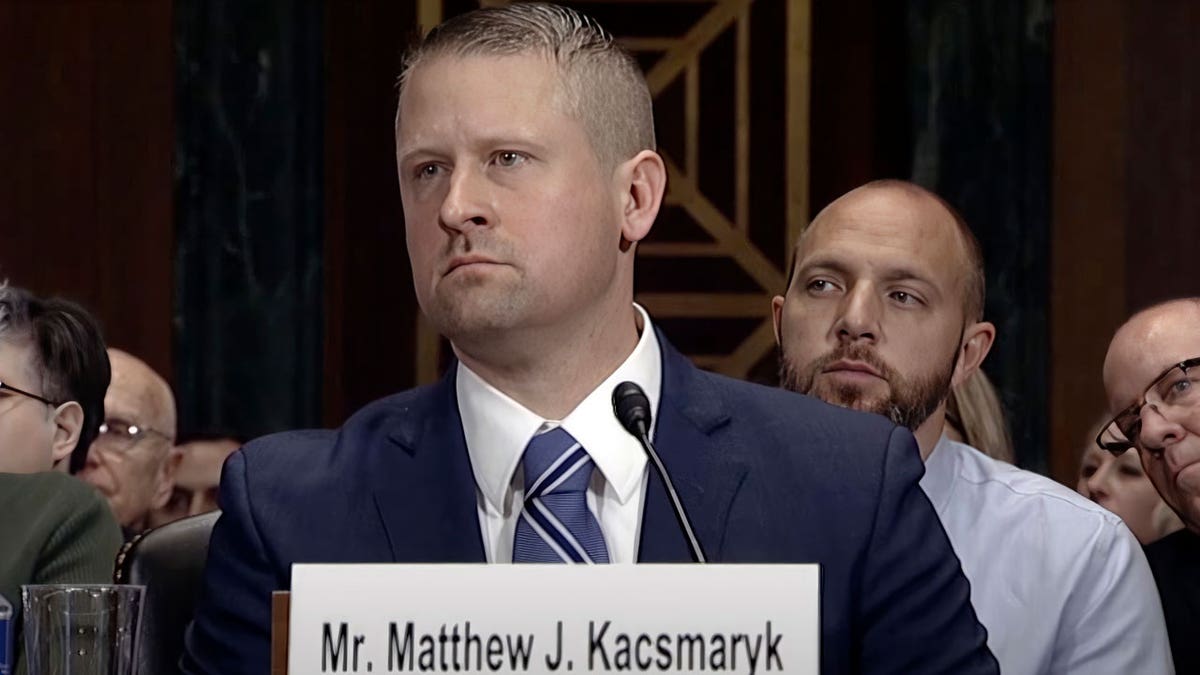
Kacsmaryk, a Trump appointee, previously ruled that parents must be informed when birth control is provided to their children under 18 years old. (Senate Judiciary Committee via AP)
In response, the federal government updated guidelines to state that Title X projects “may not require consent of parents or guardians for the provision of services to minors, nor can any Title X project staff notify a parent or guardian before or after a minor has requested and/or received Title X family planning services.”
Paxton is now seeking a permanent injunction on this rule, which he claims defies the findings of the federal court.
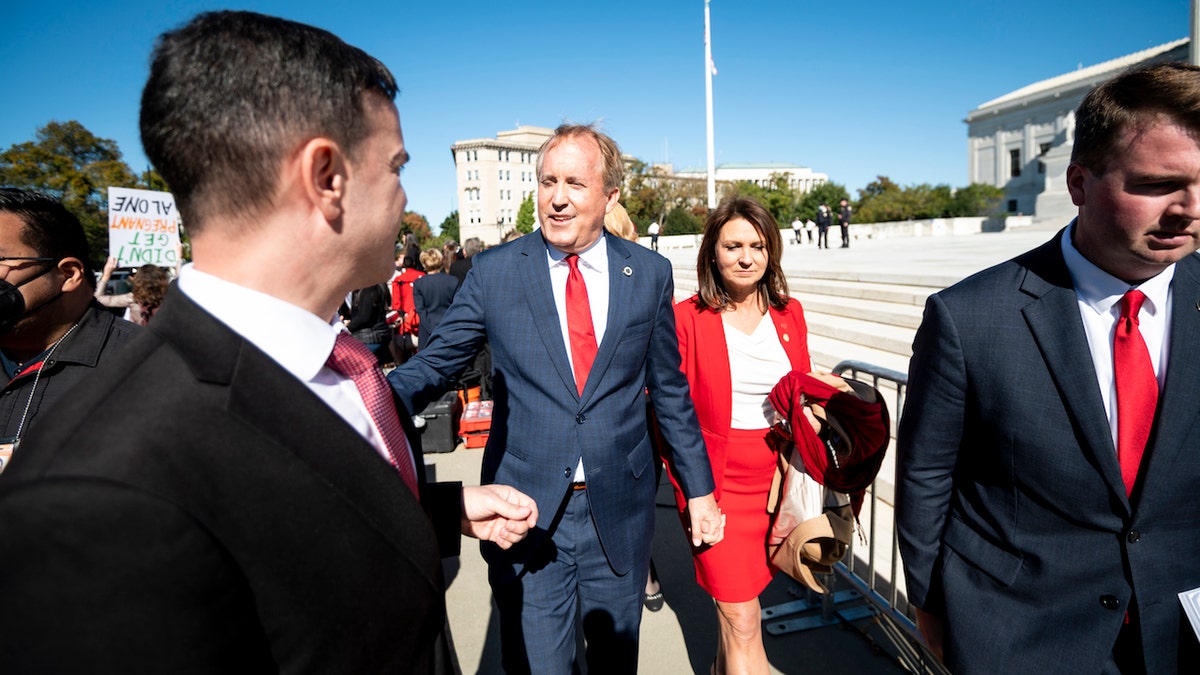
Paxton and his wife Angela are pictured outside the Supreme Court. (Bill Clark/CQ-Roll Call, Inc via Getty Images)
Paxton filed the lawsuit in a federal court in Amarillo. It will likely be heard by Kacsmaryk, the same judge who previously ruled parents must be informed of birth control provided to their children.
-

 World1 week ago
World1 week agoOne dead after car crashes into restaurant in Paris
-

 Midwest1 week ago
Midwest1 week agoMichigan rep posts video response to Stephen Colbert's joke about his RNC speech: 'Touché'
-

 News1 week ago
News1 week agoVideo: Young Republicans on Why Their Party Isn’t Reaching Gen Z (And What They Can Do About It)
-

 Movie Reviews1 week ago
Movie Reviews1 week agoMovie Review: A new generation drives into the storm in rousing ‘Twisters’
-

 News1 week ago
News1 week agoIn Milwaukee, Black Voters Struggle to Find a Home With Either Party
-

 Politics1 week ago
Politics1 week agoFox News Politics: The Call is Coming from Inside the House
-

 News1 week ago
News1 week agoVideo: J.D. Vance Accepts Vice-Presidential Nomination
-

 World1 week ago
World1 week agoTrump to take RNC stage for first speech since assassination attempt














